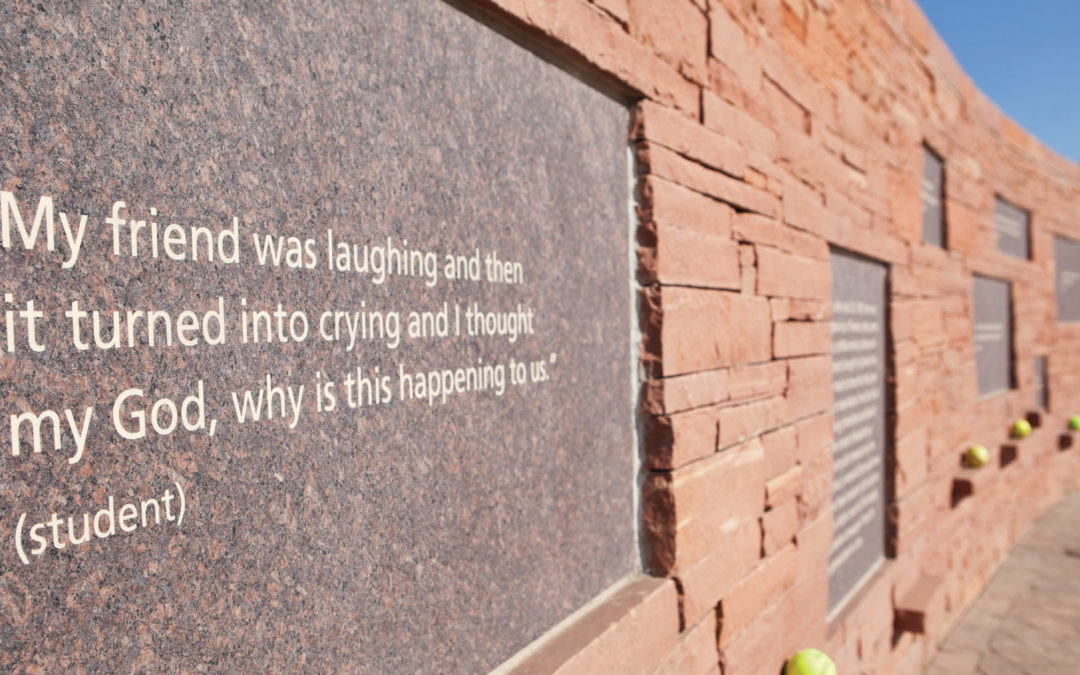By Susie Gamelin—
This week’s mass shooting…” began the report on National Public Radio. I struggled to listen to yet another story of a mass shooting and scores of innocent people who, when they woke up that morning, had not suspected that their lives would be taken or forever changed.
I live in Littleton, Colorado, a suburb of Denver. Twenty years ago this month, two seniors at our town’s Columbine High School killed a dozen students and one teacher and injured 24 others. Hundreds more lives were forever altered. Thousands—perhaps millions—were affected when family members, teachers and students in other schools, as well as grieving people around the nation and world, were counted. Twenty years later many people continue to be deeply troubled by the horror, searching for answers to unresolved questions.
What I realize from living here is that a large community can experience trauma and the lingering effects of trauma from a horrific event. As I write this, it has seemed as though mass shootings have begun happening weekly. And whenever “this week’s mass shooting” is announced, many people in Littleton react with emotions heightened by the horror of the Columbine massacre. School shootings are especially disturbing.
Some folks in our congregation were at Columbine on April 20, 1999. They and others sobbed when the shootings at Marjory Stoneman Douglas High School in Parkland, Florida, burst into the news. Others don’t want to think or talk about any of it. Some are quickly angered. They want Columbine to stand for an excellent high school, not just a massacre. Others are still upset that law enforcement stayed outside of the high school that April day, while the massacre went on and on inside. The five stages of grief—denial, anger, bargaining, depression and acceptance—are part of so many lives in Littleton.
Enough. We’ve been through “this week’s mass shooting” more times than we can count. But there is more. The congregation to which I am committed is Abiding Hope, part of the ELCA. Abiding hope. On Sunday, a gaggle of little kids gathers around one of our pastors. When the conversation nears its end, the pastor may test their understanding by saying something like: “Jesus got so mad when he was on the cross that he shouted mean things at the people below.”
And the kids shout out: “No! He forgave them.”
So the pastor continues: “And Jesus died. The end.”
The kids shout: “No! God raised him up.”
“Why would God do that?” the pastor asks.
“To show us that life and love win,” chorus the kids loudly. All of us, including the pastor, beam at this great truth.
This year, April 20 is the Saturday between the execution of Jesus on Good Friday and the Sunday astonishment of a tomb from which his body has disappeared. Some will focus on Good Friday. Some will commemorate the 20th anniversary of the massacre. Others—perhaps the biggest number—will celebrate Easter Sunday and its joyful surprise.
Jesus went to his death because he would not recant the truth that God loves all of us. He died for us. God raised him for us. God would not let the truth Jesus proclaimed stay dead. Archbishop Desmond Tutu, who grew up in South Africa and was victimized by systemic apartheid, sings this truth for us: “Goodness is stronger than evil; love is stronger than hate; light is stronger than darkness; life is stronger than death; vict’ry is ours, vict’ry is ours, through God who loves us” (Evangelical Lutheran Worship 721). Yes. Amen. So be it. So is it. The empty tomb wins. Good Friday doesn’t. Massacres don’t.
Jesus breathed peace over all of us on Easter evening, the same Spirit-filled breath that brought order to the chaos of Genesis 1:1. This gift of peace fills our relationships with God, with neighbors near and far, and with ourselves. Our self-centered ugliness can’t stop it. Goodness is stronger than evil. The children at Abiding Hope are right when they shout, “Love and life win.”
Where have I seen this profound truth about goodness, love, light and life winning? Where have I recognized the victory that comes from God?
My friend, Eileen, works through the night for Child Protective Services. She encounters frightened, abused, hungry children and loves them while she finds places where they might begin to heal.
Diane brought her great-grandchildren home when they were very young. Adopting them was the best way to let them escape the chaos of drug addiction.
Tom’s love-filled smile brightened the world when a debilitating nerve disease let him do little else. We miss that smile. Tom died young.
Two sisters I know grew up with limited opportunities because of the color of their skin and their scant education. They are grateful that they can help support their families with the minimum wages they earn as cleaning women in a nursing home.
Last April 20, Parkland teens, plus others from Philadelphia and Chicago, were invited to Littleton by Columbine High School students. The teens wanted to console their sisters and brothers and to join them in shouting, “Never again.” They know that life is stronger than death, despite the morning news.
Our grandson is a sophomore at Columbine High School this year. There is open enrollment for high school students in Littleton. He is one of nearly 1,700 teens who chose CHS. In the welcoming assembly each year, the principal assures parents and children, “We will take good care of your students.” Then, like Jesus saying “Martha, Martha” in Luke 10:41 to make sure she was listening, the Columbine principal says it again: “We will take good care of your students.”
“We are Columbine,” the students roar in response. Yes, they are. Goodness is stronger than evil. The tomb is empty. Love and life win.
The Rev. Susie Gamelin and her husband, Tim, live in Colorado. A retired ELCA pastor, she understands that her call is to wash the feet of those who are weary, confused, addicted and/or lonely.
This article is excerpted from the April 2019 issue of Gather magazine. To read more like it, subscribe to Gather.
More like this:
Listening to loneliness
I didn’t grow up deprived of opportunities to make friends. I had a loving family. I enjoyed playing with my little brother. Still, I always felt like I was missing something. Whenever a house went up for sale on our block, I would pray that a little girl would move...
Women of the ELCA triennial logos continue to inspire
Logos and themes from past Women of the ELCA triennial gatherings can inspire and challenge us today. For example, the 1990 theme, “Celebrate God’s Creation” reminds us of our call to live as stewards of God’s creation and to work toward healing and restoration in our...
Faithful eating
By Ryan Cumming THE QUESTION IN MY EMAIL inbox was one of the oddest I had received as a food systems educator: “How did a plastic box of Brussels sprouts destined for a grocery store in the northeastern U.S. end up on a discount table at a farmer’s market in the Bay...






About Rev. Gamelin’s article. Yes, love and life do win, in the long run.But the fact remains that we are enduring another mass murder, often triggered by social media and fueled by xenophobia, nearly every day now. I don’t think God wants us to sit here and reassure each other with platitudes. It only took New Zealand a matter of days to change their gun laws and confiscate citizens’ weapons.But will this every happen in the US?
How lovely to here from you! We are reeling again from the STEM school shooting, 10 minutes from our home. Words can’t be found.
You are so right, Jill. So horribly right. Why does our society allow guns to be as available as Jool e-cigs, another stupid thing appealing to kids in our community. But guns. Horrific. Unnecessary. Cruel. Frightening. The STEM school shooting occurred 10 minutes from my home. A hero killed, children injured, everyone traumatized, most deeply angered. There aren’t words. Why? What fueled the shooters? Why are relationships so distorted that hatred pulls a trigger? Today it is important to tell ourselves that God weeps with us and insists on breaking into the wounds, whispering that goodness is stronger than evil. We can stand up and get to work to stop the evil.
Thank you, Pastor Sue! Alleluia! Goodness is stronger than evil. Love is stronger than death.